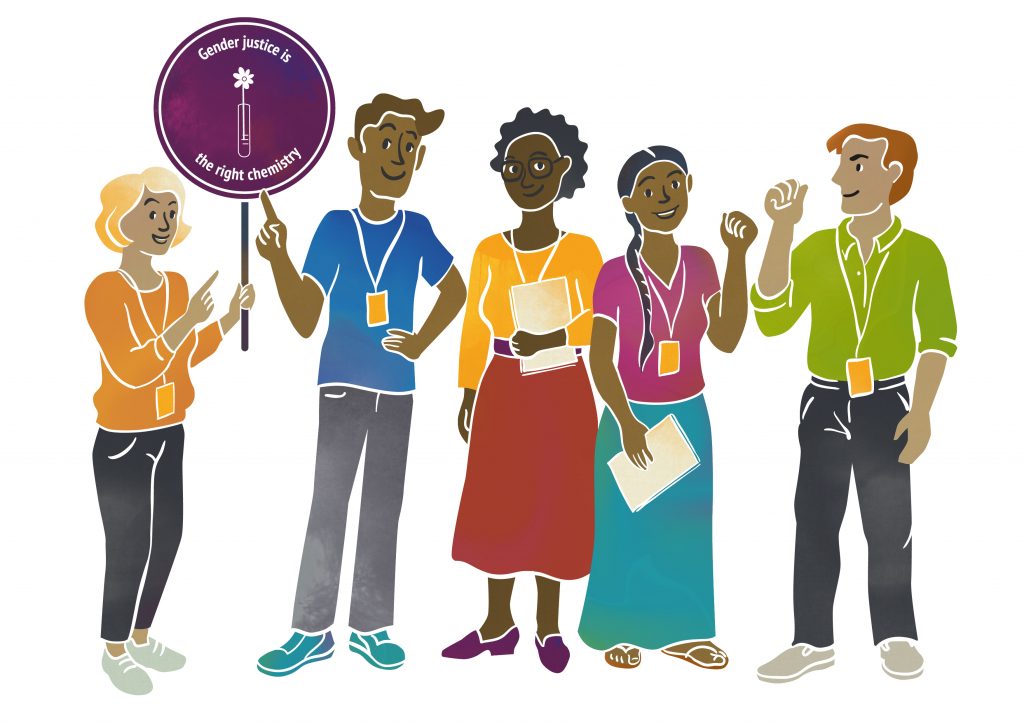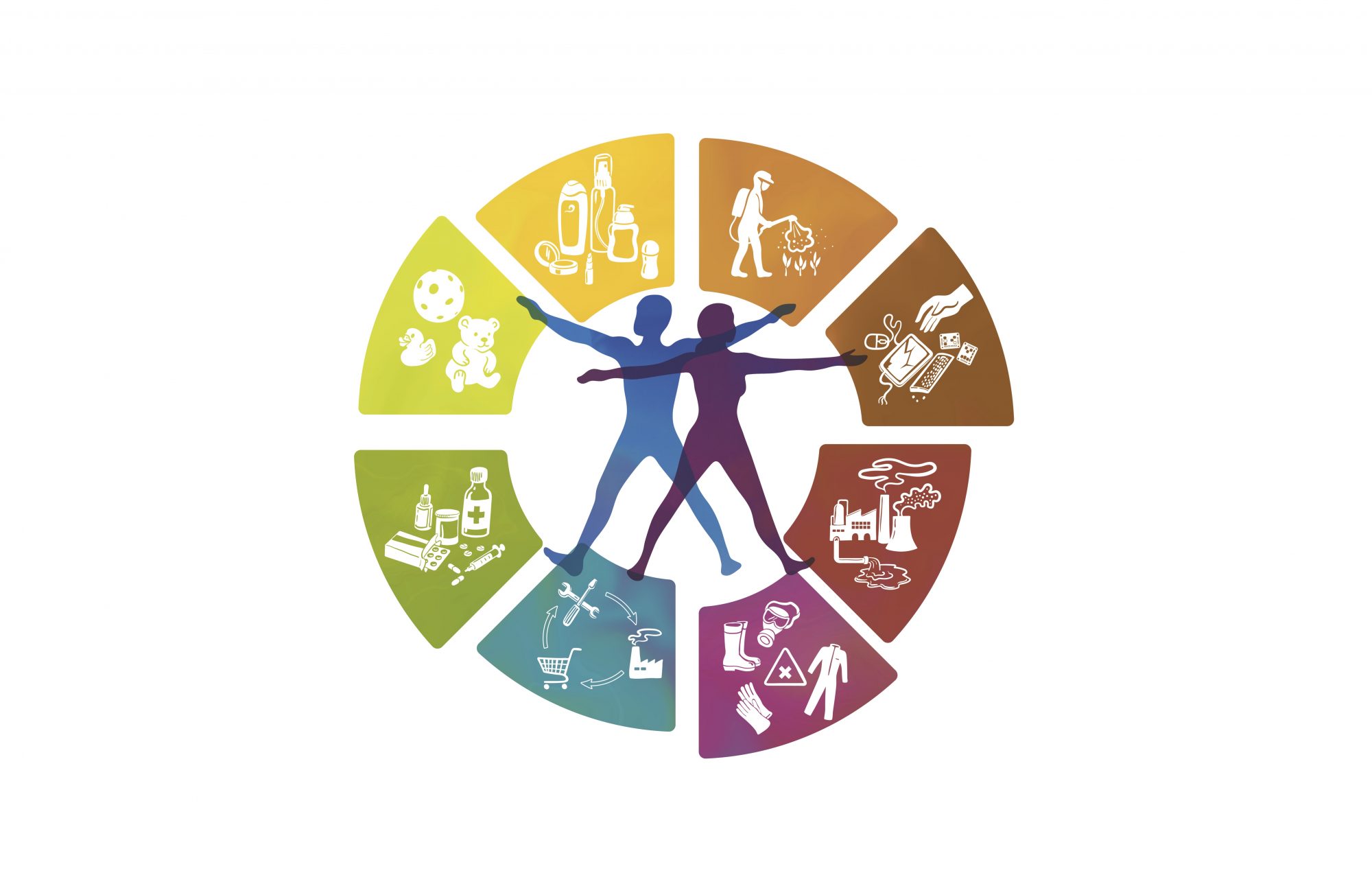#Explanation – Blog series: How to create a gender-just healthy planet

What’s a caucus?
In the context of international policy processes, the participation of non-government actors has played an increasingly important role. A variety of interest groups, stakeholders, constituencies and actors are active in processes that affect or concern them.
The term “caucus” originates from structures and mechanisms in political parties, e.g. in the US, a caucus is a „meeting held to decide which person a political party will support in an election” (Cambridge Dictionary). In international policy making, participating non-government actors are often organized in caucuses – i.e. groups of people with influence or an interest in something who meet to consider a particular issue or problem. If the groups meet very regularly, sometimes institutional groupings called ‘constituencies’ or ‘major groups’ emerge.
With Women and Gender Caucuses, Constituencies and Major Groups, feminists and women activists have established a structure to coordinate their tasks and political positions as well as to make their voices heard and advocate for gender equality within UN processes on two levels: On the one hand, their aim is to strengthen women’s active participation by sharing information and access to documents, by organizing possibilities to submit proposals or to speak at negotiation meetings, and enabling physical participation by organizing travel funding for colleagues, especially from the Global South. On the other hand, they combine expert knowledge of women’s organisations, gender experts and other academics to support gender mainstreaming activities within policy processes, often in direct contact with the respective secretariat and/or with other relevant stakeholders. Women and Gender Groups and meetings are mostly self-organised but recognized by the official institutions who regard them as liaisons or focal points to reach out and interact with particular stakeholder groups. Women and Gender Cau- cuses are usually open to all interested stakeholders working to promote human rights-based sustainable development with a focus on women’s human rights, the empowerment of women and gender equality. Sometimes, participation is limited to non-government or civil society organisations and in- dividuals, and many caucuses have developed their own rules, procedures, and governance, from electing co-chairs, through facilitating representative, joint submissions to negotiations to managing shared financial resources. During UN conferences, they met regularly to discuss the ongoing negotiations and to develop joint responses from a gender perspective, between conferences they mostly communicate via email list servers and online platforms.
A bit of history
Since many years Women and Gender Caucuses contribute to UN policies on sustainable development with successful advocacy activities:
In 1992, the Earth Summit (United Nations Conference on Environment and Development, UNCED) took place and was one of the first breakthroughs in women’s advocacy for sus- tainable development: Preparing for the conference the Women’s Caucus, organized by the Women’s Environment Development Organization (WEDO), met every morning to discuss texts, interventions and strategies, based on its own Women’s Action Agenda for a Healthy Planet, developed at the Women’s World Congress for a Healthy Planet in Miami in 1991. During the Earth Summit, the Women’s Caucus also played a key role with the Women’s Tent “Planeta Femea” of the parallel forum “Foro Global” with over 1.000 Women coming together from all regions of the world (Dankelmann 2011; WMG 2018).
The Earth Summit recognized nine stakeholder groups, so called “Major Groups”, to ensure a broad participation in the policy and implementation process: farmers, trade unions, indigenous peoples and their communities, children and youth, NGOs, local authorities, science and technology, busi- ness and industry, and women (WMG 2018). Agenda 21, one of the key outcome documents of the Earth Summit, includes chapters dealing with each of these Major Groups, recognizing their needs and roles, and underlining the need for their active participation in realizing sustainable development.
Major Groups, caucuses and constituencies today
Today, the Women’s Major Group (WMG) is an official participant in the UN processes on Sustainable Development and active at UNEP, with over 600 list server members who are organisations and individuals. The WMG is the focal point for UN-DESA, ECOSOC and the General Assembly for all UN Sustainable Development policies.
Its mandate covers Agenda 2030 for Sustainable Development, including the Sustainable Development Goals and Indicators, the Technology Facilitation Mechanism and the High-Level Political Forum. It covers the Rio+20 outcome, with SDGs, Financing for Sustainable Development, Small Island Development States SIDS, Technology. Furthermore, it also covers the global and regional policy processes of the United Nations. The Women’s Major Group on Environmental Policies follows the policy processes related to the UNEP and those governed by UNEP such as Sustainable Consumption and Production (UN DESA 2018). Additionally, the WMG works closely with other Women’s and Gender Caucuses or Constituencies in other UN policy processes, e.g. the Convention on Biological Diversity (CBD), Disaster Risk Reduction, Cities / UN Habitat, Financing for Development, Commission on Population and Development (CPD) and the United Nations Framework Convention on Climate Change (UNFCCC) (ibid.).
The Women and Gender Constituency (WGC) is, for example, one of the nine constituencies, i.e. stakeholder groups, that is part of the UNFCCC process. Established in 2009 by women and gender activists, who actively discussed whether and how the issue of gender should be given more attention at the climate change negotiations since 2003, the WGC now consists of 28 Women and Gender Organisations and Networks with advocates from more than 60 countries. Since 2015 the WGC has organized the Gender Just Climate Solu- tions Award to promote gender responsive climate awards, in 2017 the WGC managed to shape the “Gender and Work Program” that has been decided upon at the COP 20 in Lima in 2014 and the most recent highlight is the “Gender Action Plan” from COP 23 in Bonn 2017, which was finally adapted through much advocacy work after years of discussions (GenderCC 2018).
A Women and Gender Caucus for SAICM Beyond 2020
Creating an informal and open-to-all Women and Gender Caucus For the Sound Management of Chemicals and Waste can create an inspiring, useful, and powerful space for discussion, information sharing and advocacy to push forward the implementation of the 2030 Agenda and ensure the recognition of the interconnections between gender and chemicals. Such a caucus – gathering at the SAICM meetings and communicating electronically in between can strengthen the participation of (indigenous) women and also help to increase the visibility of SAICM beyond 2020.
As a starting point, we invite all stakeholders to a first, informal meeting on gender, women and chemicals and waste at the OEWG3!
Date: Wednesday, 03rd April 2019, 08:00-09:00 pm
Location: Antel Arena, Montevideo – Room: tbc
We are looking forward to seeing you!
References
Dankelmann, Irine (2011): Women on the forefront at the Earth Summit ’92 in Rio. Online at: WEDO: https://wedo.org/women-on- the-forefront-at-the-earth-summit-92-in-rio-a-personal-journey-by- irene-dankelman/.
GenderCC (2018): Looking back at 10 years GenderCC – Women for Climate Justice. https://gendercc.net/who-are-we/10-year-anniver- sary/10-years-fighting-for-climate-justice.html.
Hemmati, M. 2001. Women & Sustainable Development: From 2000 to 2002. in: F. Dodds & T. Middleton (eds.). Earth Summit 2002 – A New Deal. pp65-83. London: Earthscan, 2nd Edition
Hemmati, M. 2005. Gender & Climate Change in the North: Issues, Entry Points and Strategies for the Post-2012 Process and Beyond. genanet / Focal Point Gender Justice and Sustainability, Berlin
UN DESA (2018): Women. Online at: https://sustainabledevelopmen- t.un.org/majorgroups/women.
WMG (2018): History of Women’s Movement and Sustainable Devel- opment. http://www.womenmajorgroup.org/wp-content/uploads/ 2018/01/History-of-the-Women%E2%80%99s-Movement-and- Sustainable-Development.pdf
